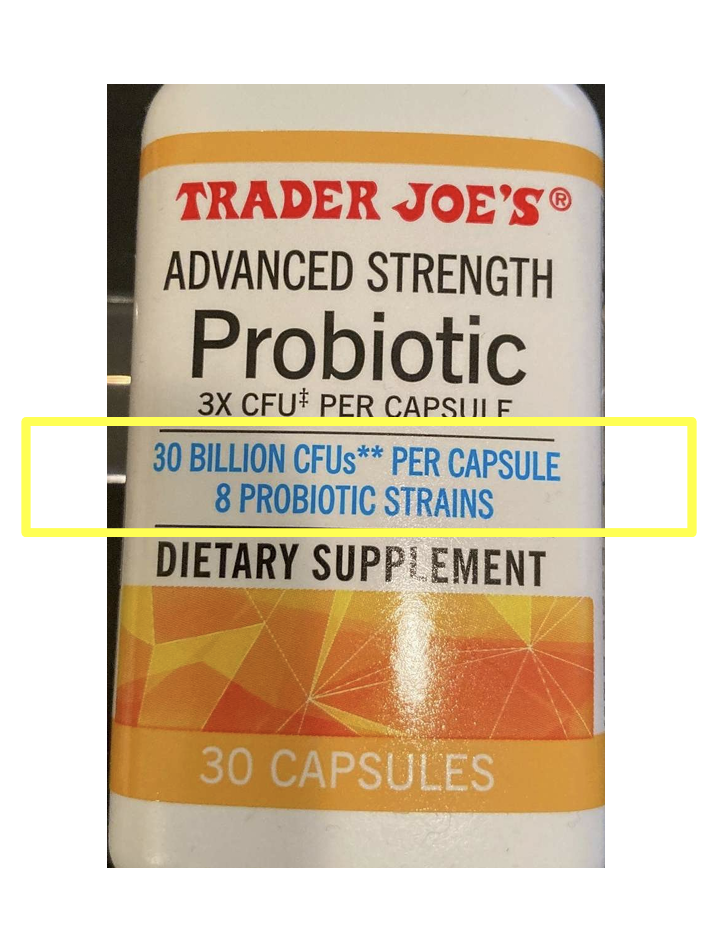Trader Joe’s Class Action Lawsuit Alleges Probiotic Capsules Contain Significantly Fewer Micro-Organisms than Advertised
Last Updated on October 21, 2025
Bibey Et al. v. Trader Joe's Company
Filed: October 3, 2025 ◆§ 3:25-cv-08473
A class action lawsuit claims that probiotic capsules produced by Trader Joe's contain less than half the colony-forming units than advertised.
California Business and Professions Code New York General Business Law California Consumers Legal Remedies Act
California
Food Medical/Health Defective Products False Advertising Fraud
A proposed class action lawsuit claims that Trader Joe’s Advanced Strength Probiotic supplement does not contain 30 billion colony-forming units (CFUs) as advertised, and instead has, at most, about eight billion CFUs.
Get class action lawsuit and class action settlement news sent to your inbox – sign up for ClassAction.org’s free weekly newsletter.
The 31-page lawsuit contends that Trader Joe's has misled consumers by overstating the efficacy and benefits of its probiotic supplement for digestive and immune health. Specifically, the filling says, the higher number of live and active microorganisms— “good bacteria”—in a probiotic helps to “support both digestive health and overall wellness,” while a decreased CFU count does not achieve these sought-after benefits as effectively.
“The number of colony-forming units directly correlates with a probiotic’s viability and its ability to effectuate its stated purposes (e.g., digestive and immune health),” the suit explains.
The plaintiffs purchased the supplements at issue several times throughout 2023 and 2024, specifically “relying on its label claims,” the suit says. However, independent analytical testing conducted by the plaintiffs on multiple samples revealed that the “CFU count [was] materially below (i.e., at best 70% less than) the promised 30 billion CFU label claim,” the lawsuit says.
This analytical testing on 12 samples across three separate lots showed that they contain 8.7 billion CFUs at best, and only 118 million at worst, the complaint states.
A recent spike in popularity caused the global probiotics market to reach a value of almost $88 billion in 2023, the case relays, and the suit claims that the majority of consumers’ “most preferred media for learning more is via product packaging.”
The lawsuit quotes the Food and Drug Administration’s Dietary Supplement Labeling Guide, which explicitly states that all supplements “must contain 100% of the volume or weight that [the manufacturer] declared on the label,” meaning supplements must consistently meet the composition, strength, and purity specifications stated on product labels before their expiration to be sold in the United States.
The Trader Joe’s class action lawsuit looks to cover any individual who purchased the Advanced Strength Probiotic in New York and California during the applicable statute of limitations period.
Looking for current class action lawsuits to join? Check out ClassAction.org’s class action lawsuit list.
Video Game Addiction Lawsuits
If your child suffers from video game addiction — including Fortnite addiction or Roblox addiction — you may be able to take legal action. Gamers 18 to 22 may also qualify.
Learn more:Video Game Addiction Lawsuit
Depo-Provera Lawsuits
Anyone who received Depo-Provera or Depo-Provera SubQ injections and has been diagnosed with meningioma, a type of brain tumor, may be able to take legal action.
Read more: Depo-Provera Lawsuit
How Do I Join a Class Action Lawsuit?
Did you know there's usually nothing you need to do to join, sign up for, or add your name to new class action lawsuits when they're initially filed?
Read more here: How Do I Join a Class Action Lawsuit?
Stay Current
Sign Up For
Our Newsletter
New cases and investigations, settlement deadlines, and news straight to your inbox.
Before commenting, please review our comment policy.